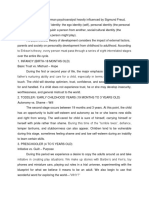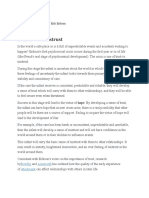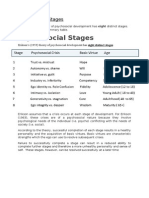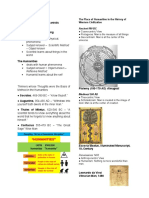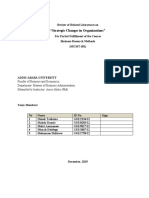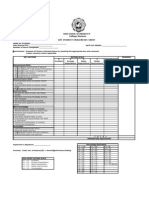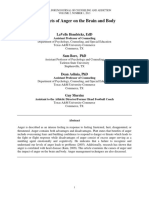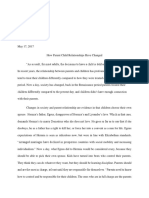0 ratings0% found this document useful (0 votes)
67 viewsPsychosocial Development
Psychosocial Development
Uploaded by
AhnThe document summarizes Erik Erikson's eight stages of psychosocial development. Each stage is defined by a conflict between opposing forces that shape development. The stages include: 1) Trust vs. Mistrust, 2) Autonomy vs. Shame/Doubt, 3) Initiative vs. Guilt, 4) Industry vs. Inferiority, 5) Identity vs. Role Confusion, 6) Intimacy vs. Isolation, 7) Generativity vs. Stagnation, and 8) Integrity vs. Despair. Successful resolution of each stage's conflict leads to healthy development and a strong sense of self.
Copyright:
© All Rights Reserved
Available Formats
Download as DOCX, PDF, TXT or read online from Scribd
Psychosocial Development
Psychosocial Development
Uploaded by
Ahn0 ratings0% found this document useful (0 votes)
67 views3 pagesThe document summarizes Erik Erikson's eight stages of psychosocial development. Each stage is defined by a conflict between opposing forces that shape development. The stages include: 1) Trust vs. Mistrust, 2) Autonomy vs. Shame/Doubt, 3) Initiative vs. Guilt, 4) Industry vs. Inferiority, 5) Identity vs. Role Confusion, 6) Intimacy vs. Isolation, 7) Generativity vs. Stagnation, and 8) Integrity vs. Despair. Successful resolution of each stage's conflict leads to healthy development and a strong sense of self.
Original Description:
Lecture Notes
Original Title
PSYCHOSOCIAL DEVELOPMENT
Copyright
© © All Rights Reserved
Available Formats
DOCX, PDF, TXT or read online from Scribd
Share this document
Did you find this document useful?
Is this content inappropriate?
The document summarizes Erik Erikson's eight stages of psychosocial development. Each stage is defined by a conflict between opposing forces that shape development. The stages include: 1) Trust vs. Mistrust, 2) Autonomy vs. Shame/Doubt, 3) Initiative vs. Guilt, 4) Industry vs. Inferiority, 5) Identity vs. Role Confusion, 6) Intimacy vs. Isolation, 7) Generativity vs. Stagnation, and 8) Integrity vs. Despair. Successful resolution of each stage's conflict leads to healthy development and a strong sense of self.
Copyright:
© All Rights Reserved
Available Formats
Download as DOCX, PDF, TXT or read online from Scribd
Download as docx, pdf, or txt
0 ratings0% found this document useful (0 votes)
67 views3 pagesPsychosocial Development
Psychosocial Development
Uploaded by
AhnThe document summarizes Erik Erikson's eight stages of psychosocial development. Each stage is defined by a conflict between opposing forces that shape development. The stages include: 1) Trust vs. Mistrust, 2) Autonomy vs. Shame/Doubt, 3) Initiative vs. Guilt, 4) Industry vs. Inferiority, 5) Identity vs. Role Confusion, 6) Intimacy vs. Isolation, 7) Generativity vs. Stagnation, and 8) Integrity vs. Despair. Successful resolution of each stage's conflict leads to healthy development and a strong sense of self.
Copyright:
© All Rights Reserved
Available Formats
Download as DOCX, PDF, TXT or read online from Scribd
Download as docx, pdf, or txt
You are on page 1of 3
PSYCHOSOCIAL DEVELOPMENT walking, grasping, and muscular control.
PSYCHOSOCIAL DEVELOPMENT THEORY IS The child learns self-control but may
BASED ON EIGHT STAGES OF DEVELOPMENT develop shame, doubt, impulsivity, or
compulsion if not handled well.
STAGE 1- ORAL SENSORY
Age: Birth to 1 year STAGE 3 – LOCOMOTOR
Conflict: Trust vs. Mistrust Age: 3 to 6 years
Event: feeding Conflict: Initiative vs. Guilt
Relationship: Mother Event: Independence
Resolution: Hope Relationship: Family
Resolution: Purpose
This stage is all about fulfilling needs.
The baby needs to trust the world In this stage, children want to
around them to take care of their understand the world and they ask too
needs. If they are hungry, they need to many darn questions!!!!
develop trust that they will be fed. If If their initiative in questioning the
they are not fed, or their diaper is left world is encouraged, then they will feel
dirty, they may develop a mistrust of comfortable with expressing their
the outside world. This sense of trust or curiosity throughout the rest of their
mistrust can affect us throughout the life.
rest of our lives. If we discourage them and tell them to
The infant must develop a loving, shut up, then they will feel guilty about
trusting relationship with the their questioning and avoid being
mother/caregiver through feeding, inquisitive later.
teething and comforting failure to The child may show too much force in
resolve this conflict can lead to sensory this stage causing feelings of
distortion and withdrawal. guilt failure to resolve this conflict can
lead to ruthlessness and inhibition. The
STAGE 2 – MUSCULAR-ANAL child continues to become more
Age: 1 to 3 years assertive in exploration, discovery,
Conflict: Autonomy vs. Shame/Doubt adventure, and play.
Event: toilet training
Relationship: Parents STAGE 4 – LATENCY
Resolution: Will Age:6 to 12 years:
Conflict: Industry vs. Inferiority
Autonomy means being your own boss. Event: school
Here a toddler tries to control their own Relationships: teachers, friends, and
bodies by toilet training and their neighborhood
environment, by always saying "NO!!!!". Resolution: Competency
Sometimes they do poopy in their pants
or get yelled at by their parents, causing This is where most children begin
shame and doubt in their own abilities. formal education (what we call the
If we learn how to control ourselves in school).
reasonable ways, we develop a healthy For the first time, children are being
will. We are then able to face the later formally evaluated.
challenges of life. If a child raises their hand in class and
The child’s energy is directed towards answers a question correctly, then
mastering physical skills such as
he/she will feel industrious Relationships: lovers, friends, and work
(competent). connections
If he/she tries to answer a question but Resolution: Love
stutters to get out the wrong answer,
and other students all start making fun Young adults (early 20s into early 30s)
of his/her speech impediment, then the are trying to balance their career efforts
child will feel inferior. (work, school, or self-improvement)
The child must learn to deal with new with the need to be in an intimate
skills and develop a sense of relationship with another person.
achievement and accomplishment How much time should I spend looking
failure to do so can create a sense of for a relationship? What if I don't find
inferiority, failure, and incompetence anybody? What if I am all alone for the
rest of my life? In this stage, the
STAGE 5 – ADOLESCENCE individual must develop intimate
Age: 12 to 20 years relationships through work and social
Conflict: Identity vs. Role confusion life failure to make such connections
Event: development of peer relationships can lead to promiscuity, exclusivity, and
Relationships: peers, groups, and social isolation.
influences
Resolution: Fidelity STAGE 7 – MIDDLE ADULTHOOD
Age: 40 to 65 years
In adolescence, Erikson believed that a Conflict: generativity vs. stagnation
teenager’s main social need is to Event: parenting
discover his or her social identity. Relationships: children and the community
While searching for your identity, you Resolution: Care
may try out different roles, like trying to
fit into various social groups, Erikson believed that by the time we
experimenting with drugs or sex, or just reach our mid-30s to mid-50s we start
changing your wardrobe. to really examine our lives and see if it
You should be trying to find a stable is going the way we planned it or did
sense of self now, or Erikson believed they take a drastic turn.
you may have an identity crisis later. This is where some people take drastic
The teenager must achieve a sense of steps and change their lives.
identity in occupation, sex roles, You could see a lot of late divorces or
politics, and religion. In addition, they extreme changes in clothes or cars- we
must resolve their identity and call this experience a mid-life crisis this
direction. stage is based on the idea that each
Failure to make these resolutions can adult must find a way to satisfy,
lead to the repression of aspects of the support, and contribute to the next
individual for the sake of others generation; it is often thought of as
(fanaticism). giving back failure to resolve this stage
can lead to overextension or objectivity.
STAGE 6 – YOUNG ADULTHOOD
Age: 20 to 40 years STAGE 8 – MATURITY INTEGRITY VS. DESPAIR
Conflict: Intimacy vs. Isolation Age: +65 years
Event: parenting Conflict: Ego Integrity vs. Despair
An event is a reflection on and acceptance of
the individual’s life
Relationship: All humans
Resolution: Wisdom
You might also like
- Nicholas Mazza - Poetry Therapy - Theory and Practice (2016, Routledge) - Libgen - LiDocument287 pagesNicholas Mazza - Poetry Therapy - Theory and Practice (2016, Routledge) - Libgen - LidenisseNo ratings yet
- Reflection On Erik Erikson Stages of DevelopmentDocument5 pagesReflection On Erik Erikson Stages of DevelopmentFeby DemellitesNo ratings yet
- Excel NotesDocument9 pagesExcel NotesAhn100% (1)
- Standing As Awareness - The Dire - Greg GoodeDocument96 pagesStanding As Awareness - The Dire - Greg GoodeIzac Souza100% (2)
- Personal Development Lesson 2Document54 pagesPersonal Development Lesson 2Ysay FranciscoNo ratings yet
- OBE Syllabus PE 212 DexterDocument9 pagesOBE Syllabus PE 212 DexterFlorina Nadorra RamosNo ratings yet
- Erikson Stages of Psychosocial DevelopmentDocument20 pagesErikson Stages of Psychosocial DevelopmentJonalyn Carandang100% (4)
- At The End of This Module, You Should Be Able To: Explain The Eight Stages of Psychosocial DevelopmentDocument5 pagesAt The End of This Module, You Should Be Able To: Explain The Eight Stages of Psychosocial DevelopmentChris KabilingNo ratings yet
- Erik EriksonDocument29 pagesErik EriksonAumi MarquezNo ratings yet
- 2 Theories of DevelopmentDocument41 pages2 Theories of DevelopmentMartir Crismarie P.No ratings yet
- Perdev Chapter 4Document38 pagesPerdev Chapter 4Donita BinayNo ratings yet
- Perdev Chapter 4Document38 pagesPerdev Chapter 4Donita BinayNo ratings yet
- Erik EriksonDocument25 pagesErik EriksonPratiksha GuptaNo ratings yet
- Erik Erikson: Psychosocial DevelopmentDocument21 pagesErik Erikson: Psychosocial DevelopmentcharleneNo ratings yet
- Reviewer in Personal Development 2nd QuarterDocument2 pagesReviewer in Personal Development 2nd QuarterDave Homer Huerto MoralesNo ratings yet
- Erikson's Stages of Psychosocial DevelopmentDocument2 pagesErikson's Stages of Psychosocial DevelopmentMarie Ann Toong QuicoNo ratings yet
- Child DevelopmentDocument22 pagesChild DevelopmentPrincess Mae BaldoNo ratings yet
- Project Based AssessmentDocument8 pagesProject Based AssessmentDonna Lyn BoncodinNo ratings yet
- Erikson's Psychosocial Stages Summary ChartDocument3 pagesErikson's Psychosocial Stages Summary ChartWiljohn de la CruzNo ratings yet
- Erickson's Theory PDFDocument19 pagesErickson's Theory PDFNatasha ShangeNo ratings yet
- Erikso Theory by SsentongoDocument12 pagesErikso Theory by SsentongoSsentongo NazilNo ratings yet
- Erikson's Psychosocial DevelopmentDocument38 pagesErikson's Psychosocial DevelopmentAmeil OrindayNo ratings yet
- Psychosocial TheoryDocument30 pagesPsychosocial TheoryChing MaravillaNo ratings yet
- AP Psychology - Erikson's Stages of Psychosocial DevelopmentDocument5 pagesAP Psychology - Erikson's Stages of Psychosocial DevelopmentholodoggoNo ratings yet
- EricsonDocument3 pagesEricsonKashif SaeedNo ratings yet
- Personal Development Lesson 1Document49 pagesPersonal Development Lesson 1YANEENo ratings yet
- Human Development PDFDocument57 pagesHuman Development PDFImee Nicole Binag FranciscoNo ratings yet
- Trust vs. Mistrust: Bowlby Ainsworth AttachmentDocument5 pagesTrust vs. Mistrust: Bowlby Ainsworth AttachmentErnie EstreraNo ratings yet
- Stages of Growth and Development Ppt. NEWDocument11 pagesStages of Growth and Development Ppt. NEWArt Albay100% (1)
- Erik Erikson - : Theory Centered On Psychosocial Development Rather Than Psychosexual Development. Sigmund FreudDocument14 pagesErik Erikson - : Theory Centered On Psychosocial Development Rather Than Psychosexual Development. Sigmund FreudRaikzel BondestoNo ratings yet
- Erik Erikson's: Stages of Psychosocial DevelopmentDocument44 pagesErik Erikson's: Stages of Psychosocial Developmentbea locsinNo ratings yet
- Erik Erikson: Psychosocial DevelopmentDocument22 pagesErik Erikson: Psychosocial DevelopmentThia SolveNo ratings yet
- Erik Erikson's Theory of Psychosocial DevelopmentDocument35 pagesErik Erikson's Theory of Psychosocial DevelopmentMa. Rochelle CabralesNo ratings yet
- Chapters 6 7 EDFLCTDocument27 pagesChapters 6 7 EDFLCTjnpolines.chmsuNo ratings yet
- Erikson's Psychosocial DevelopmentDocument5 pagesErikson's Psychosocial DevelopmentMarina Charlotte FournesNo ratings yet
- Erik Erikson's Stages of Psychosocial Development by DR - Saul McLeodDocument6 pagesErik Erikson's Stages of Psychosocial Development by DR - Saul McLeoddanielgriffinotherNo ratings yet
- MuriumFatima - 2335 - 15662 - 7 - Developmental Graphic OrganizerDocument4 pagesMuriumFatima - 2335 - 15662 - 7 - Developmental Graphic OrganizerHasnain JawedNo ratings yet
- Erik Erikson Stages of Development 1Document3 pagesErik Erikson Stages of Development 1An Gielyn ʚĭɞNo ratings yet
- #5-Erik EriksonDocument2 pages#5-Erik EriksonKim BrionesNo ratings yet
- L-4-4 Erik-Erikson - 2023Document9 pagesL-4-4 Erik-Erikson - 2023arccool72No ratings yet
- Hasrul Hosshan Jabatan Pendidikan Awal Kanak-Kanak & Pendidikan KhasDocument30 pagesHasrul Hosshan Jabatan Pendidikan Awal Kanak-Kanak & Pendidikan KhasMohd TahirNo ratings yet
- 8 Stages of Development by Erik EriksonDocument6 pages8 Stages of Development by Erik EriksonErma Cenita BaramedaNo ratings yet
- Erik Erikson's Psychosocial Theory of DevelopmentDocument28 pagesErik Erikson's Psychosocial Theory of DevelopmentRied Nepomuceno100% (1)
- Infancy: Trust vs. Mistrust (0 To 1 Year)Document5 pagesInfancy: Trust vs. Mistrust (0 To 1 Year)karyl lynNo ratings yet
- Eriksons Stages of Psychosocial DevelopmentDocument41 pagesEriksons Stages of Psychosocial Developmentjeff kotxNo ratings yet
- Stages of Personality DevelopmentDocument1 pageStages of Personality Developmentjoshua sedaNo ratings yet
- Eriksons Psychosocial DevelopmentDocument27 pagesEriksons Psychosocial DevelopmentRenz Daniel R. ElmidoNo ratings yet
- Summary Chart: Stage 1: Oral-SensoryDocument4 pagesSummary Chart: Stage 1: Oral-SensoryWaibhav KrishnaNo ratings yet
- Erik Erikson Theory: Psychosocial DevelopmentDocument36 pagesErik Erikson Theory: Psychosocial DevelopmentRichard RamosNo ratings yet
- Developmental TheoryDocument9 pagesDevelopmental TheoryLei ぱんがにばんNo ratings yet
- Psychosocial DevDocument4 pagesPsychosocial Devsammythefujoshi17No ratings yet
- Psychosocial Stages by EriksonDocument7 pagesPsychosocial Stages by EriksonAl MahdiNo ratings yet
- 2_Session2ADocument17 pages2_Session2ANova Lyda DogaoNo ratings yet
- Theories of Development: Lecturer Psychology Peoples University of Medical Health Sciences For Women Nawabshah SBADocument32 pagesTheories of Development: Lecturer Psychology Peoples University of Medical Health Sciences For Women Nawabshah SBAAzra BalochNo ratings yet
- Chapter 28 Principles of Growth and Development Erikson's Psychosocial TheoryDocument62 pagesChapter 28 Principles of Growth and Development Erikson's Psychosocial Theoryprettyash050905No ratings yet
- Theories of Human Development 1Document60 pagesTheories of Human Development 1SimplelamNo ratings yet
- PERDEV DLL Unit 1 - M3 (Developmental Stages Handout)Document4 pagesPERDEV DLL Unit 1 - M3 (Developmental Stages Handout)Leonila MirandaNo ratings yet
- Trust vs. MistrustDocument5 pagesTrust vs. MistrustCharm TanyaNo ratings yet
- Erik Erikson, Bandura & MarieDocument9 pagesErik Erikson, Bandura & MarielolaingNo ratings yet
- DR - Harpal Kaur Aujla (Associate Professor) Akal College of Education, Mastuana Sahib Sangrur (Punjab)Document20 pagesDR - Harpal Kaur Aujla (Associate Professor) Akal College of Education, Mastuana Sahib Sangrur (Punjab)Renalyne Andres BannitNo ratings yet
- Stages of PsychosocialDocument9 pagesStages of PsychosocialAL Bharwani Dizon100% (1)
- Formative Assessment 2Document5 pagesFormative Assessment 2Jonah DelmundoNo ratings yet
- Assignment:: Erik Erikson's Psychosocial TheoryDocument3 pagesAssignment:: Erik Erikson's Psychosocial TheoryRency RamosNo ratings yet
- Emotionally Resilient Tweens and Teens: Empowering Your Kids to Navigate Bullying, Teasing, and Social ExclusionFrom EverandEmotionally Resilient Tweens and Teens: Empowering Your Kids to Navigate Bullying, Teasing, and Social ExclusionNo ratings yet
- Lesson 1Document5 pagesLesson 1AhnNo ratings yet
- Introduction To HciDocument5 pagesIntroduction To HciAhnNo ratings yet
- When Technology and Humanity CrossDocument3 pagesWhen Technology and Humanity CrossAhnNo ratings yet
- Material SelfDocument9 pagesMaterial SelfAhnNo ratings yet
- Lecture 7 ReviewerDocument21 pagesLecture 7 ReviewerAhnNo ratings yet
- Gecrea Midterm ReviewerDocument1 pageGecrea Midterm ReviewerAhnNo ratings yet
- Government WhipDocument2 pagesGovernment WhipAhnNo ratings yet
- Midterm ReviewerDocument9 pagesMidterm ReviewerAhnNo ratings yet
- ARTWORKSDocument3 pagesARTWORKSAhnNo ratings yet
- Session 4 ReviewerDocument7 pagesSession 4 ReviewerAhnNo ratings yet
- Lecture 8Document9 pagesLecture 8AhnNo ratings yet
- Lecture 2 ReviewerDocument7 pagesLecture 2 ReviewerAhnNo ratings yet
- Gecart ReviewerDocument22 pagesGecart ReviewerAhnNo ratings yet
- Reviewer ItdrcDocument14 pagesReviewer ItdrcAhnNo ratings yet
- Session 5Document5 pagesSession 5AhnNo ratings yet
- Session 2Document4 pagesSession 2AhnNo ratings yet
- Sample QuizDocument2 pagesSample QuizAhnNo ratings yet
- Pathfit 2 ReviewerDocument9 pagesPathfit 2 ReviewerAhnNo ratings yet
- SelectorDocument5 pagesSelectorAhnNo ratings yet
- CSS ReviewerDocument7 pagesCSS ReviewerAhnNo ratings yet
- Components of The System UnitDocument4 pagesComponents of The System UnitAhnNo ratings yet
- Communicating With Members of The Workplace EffectivelyDocument4 pagesCommunicating With Members of The Workplace EffectivelyAhnNo ratings yet
- The Internet and The World Wide WebDocument4 pagesThe Internet and The World Wide WebAhnNo ratings yet
- Geccom Final Term ReviewerDocument17 pagesGeccom Final Term ReviewerAhnNo ratings yet
- CSS PropertyDocument4 pagesCSS PropertyAhnNo ratings yet
- Application SoftwareDocument3 pagesApplication SoftwareAhnNo ratings yet
- HTML TagsDocument2 pagesHTML TagsAhnNo ratings yet
- Inline CodesDocument4 pagesInline CodesAhnNo ratings yet
- Mathematical Language and SymbolDocument7 pagesMathematical Language and SymbolAhnNo ratings yet
- Attention Program: # 1 Count and Mand (Use When Problem Behavior Has Already Occurred)Document3 pagesAttention Program: # 1 Count and Mand (Use When Problem Behavior Has Already Occurred)Maria Celeste BlazquezNo ratings yet
- 3228 ShaharyrDocument40 pages3228 ShaharyrAwais AkramNo ratings yet
- Robert Glasscock-Astrologys Future 2014Document26 pagesRobert Glasscock-Astrologys Future 2014Anonymous C2HRww2MMt100% (1)
- Eng 9 Unit 3 SupplementaryDocument2 pagesEng 9 Unit 3 SupplementaryDiệu Anh HoàngNo ratings yet
- Self HandicappingDocument7 pagesSelf HandicappingAkinyemi OlusegunNo ratings yet
- Progress Report Sheet Ay 2018-2019 - Speaking SkillsDocument2 pagesProgress Report Sheet Ay 2018-2019 - Speaking Skillsapi-427920673No ratings yet
- Strategic Changes in Organizations Final DocumentDocument17 pagesStrategic Changes in Organizations Final DocumentHenok TeshomeNo ratings yet
- Standardized ToolsDocument41 pagesStandardized ToolsSanjeeta BhagatNo ratings yet
- Cherry 2020-What Is Personality-The Big 5 Personality-Impact Personaliti To HealthDocument14 pagesCherry 2020-What Is Personality-The Big 5 Personality-Impact Personaliti To Healthjuwita syafitri22No ratings yet
- Word Wall ListDocument24 pagesWord Wall ListquratNo ratings yet
- Performance ChecklistDocument5 pagesPerformance ChecklistJulius Ryan Lim BalbinNo ratings yet
- Consultancy in PracticeDocument12 pagesConsultancy in PracticeRakib TopuNo ratings yet
- 18 NİSAN 2021: Www. Si Navkampi - Com. TRDocument24 pages18 NİSAN 2021: Www. Si Navkampi - Com. TRMustafa AriNo ratings yet
- Writing A Monologue in RoleDocument2 pagesWriting A Monologue in Roleapi-248274109No ratings yet
- Worksheet - Applying Cultural Dimensions To A Gulf AudienceDocument5 pagesWorksheet - Applying Cultural Dimensions To A Gulf AudienceHusain SalehNo ratings yet
- Wednesday DWPDocument3 pagesWednesday DWPapi-397919489No ratings yet
- K To 12 Melcs With CG Codes Homeroom Guidance Program1Document22 pagesK To 12 Melcs With CG Codes Homeroom Guidance Program1Rose MayNo ratings yet
- Pr2 Ict EditedDocument32 pagesPr2 Ict EditedMer Ana Maniquez TabarNo ratings yet
- OJT Student Evaluation Sheet (Version 1)Document6 pagesOJT Student Evaluation Sheet (Version 1)Kouji Coloma100% (1)
- OK - Analysing The Relational Components of Systemic Family Therapy Through The Lenses of Self Positions and Therapeutic Alliance - An Exploratory StudyDocument19 pagesOK - Analysing The Relational Components of Systemic Family Therapy Through The Lenses of Self Positions and Therapeutic Alliance - An Exploratory StudyamandabuenoNo ratings yet
- Hendricks, LaVelle The Effects of Anger On The Brain and Body NFJCA V2 N1 2013Document12 pagesHendricks, LaVelle The Effects of Anger On The Brain and Body NFJCA V2 N1 2013Antonio HortonNo ratings yet
- Parent-Child Relationship EssayDocument4 pagesParent-Child Relationship Essayapi-4571701600% (1)
- Govinda Sir - Paper 1Document6 pagesGovinda Sir - Paper 1Er Navaraj ParajuliNo ratings yet
- Empathic AbilitiesDocument8 pagesEmpathic AbilitiesJulie SmithNo ratings yet
- Management Theory and Practice 1Document7 pagesManagement Theory and Practice 1Yogesh BhapkarNo ratings yet
- FRIT 7234 Ethical Use of Information Embedded LessonDocument9 pagesFRIT 7234 Ethical Use of Information Embedded LessonMunoNo ratings yet
- Reading TaskDocument8 pagesReading TaskCarmen Lizbeth Perez Mendoza100% (1)

